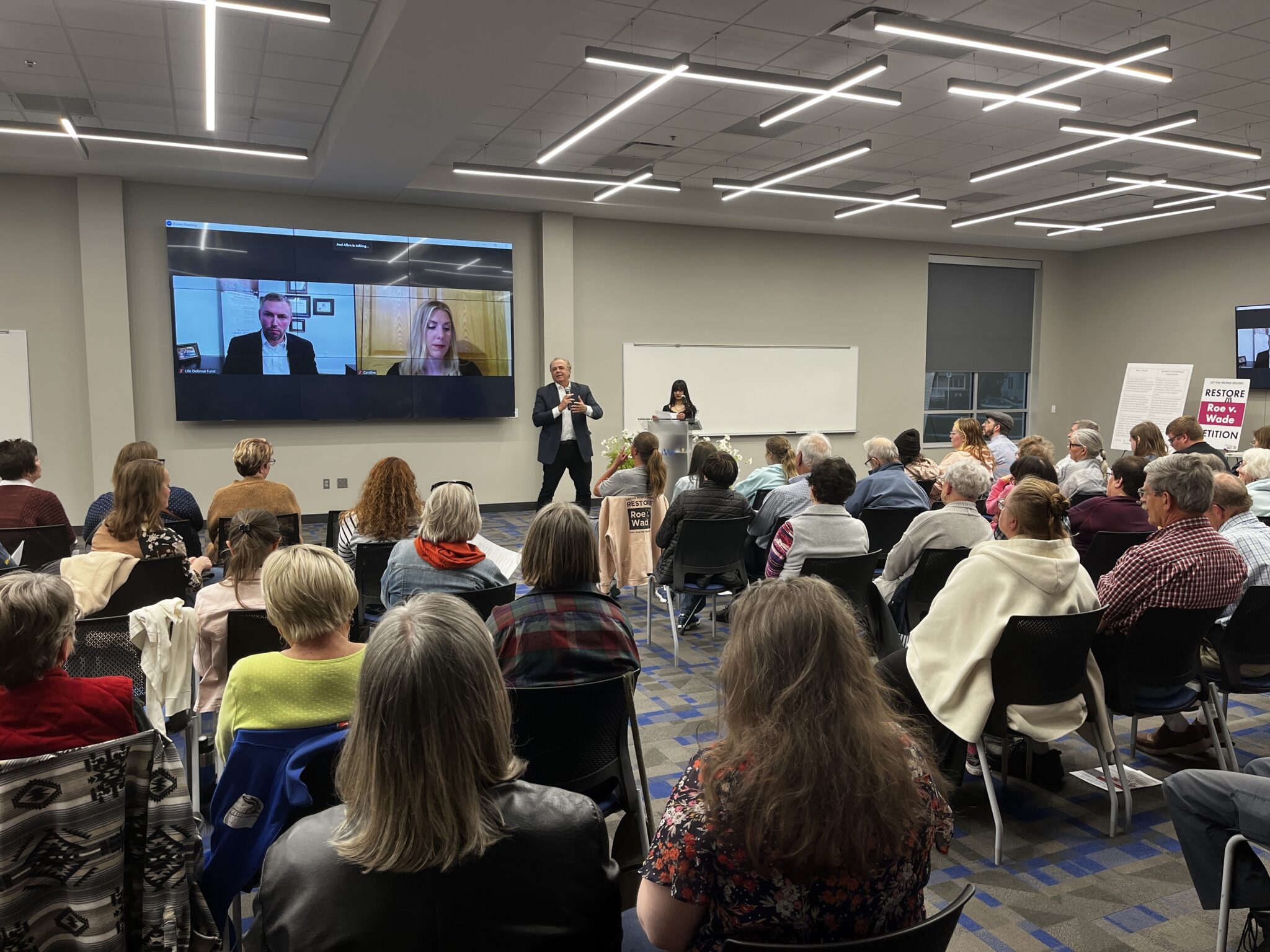
Joshua Haiar/South Dakota Searchlight
MITCHELL — A proposed measure to reinstate abortion rights hasn’t made the ballot yet, but the debate is underway.
About 100 people converged Tuesday evening on Dakota Wesleyan University for a discussion sponsored by the university’s McGovern Center as part of its Courageous Conversation series.
The room was filled with attendees from both sides of the issue eager to dissect the measure, which seeks to secure abortion rights in South Dakota, reversing the effects of the U.S. Supreme Court’s 2022 decision that overturned Roe v. Wade. When that happened, a trigger law that the South Dakota Legislature had adopted in 2005 immediately banned abortions in the state except when necessary to save the life of the mother.
The ballot measure would amend the state constitution to legalize all abortions during the first trimester of pregnancy. It would allow regulations on abortion during the second trimester, but only in ways that are “reasonably related to the physical health of the pregnant woman.” In the third trimester, it would allow regulations up to a ban on abortions, with exceptions for the life or health of the pregnant woman.
Rick Weiland, whose Dakotans for Health group is spearheading the measure, pointed to a 2022 poll that found 76% of registered South Dakota voters support allowing abortion in cases of rape and incest. Meanwhile, he said, the state’s current law has stripped women of the right to choose whether or not to carry “their rapist’s fertilized embryo to term.”
“And the Legislature refuses to address it,” Weiland said. “You can’t give a rapist’s embryo more rights than a woman who has been raped.”
State Rep. Jon Hansen, R-Dell Rapids, who also serves as vice president of South Dakota Right to Life and co-chair of Life Defense Fund, and attended the discussion via Zoom, said the amendment goes beyond rape and incest exceptions.
“Instead, what they wrote is an amendment that legalizes abortion past the point of viability, past the point where the baby can just be born outside the womb, and up until the point of birth,” Hansen said.
He highlighted the exception for the health of the mother in the third trimester, which he said could include mental distress.
Hansen added that the ballot measure would prohibit the state from implementing health and safety regulations on abortion during the first trimester of pregnancy.
“It’s like the wild, wild west with this abortion amendment,” Hansen said.
OB-GYN Michael Krause, of Mitchell, said doctors would not use mental distress as a justification to perform abortions in the third trimester of pregnancy.
“That is totally false,” he said. “It is harder on that mother, it is not healthier.”
Patti Giebink, a Chamberlain-based OB-GYN and anti-abortion activist, said many women who receive abortions go on to regret them.
“Elective abortion is not health care,” she said. “Because pregnancy is not a disease.”
Sheryl Johnson, the state Democratic Party’s presumptive nominee for U.S. House, said “people are confused” by the language in the state’s abortion ban. She said one of her daughters had a miscarriage a couple of weeks after Roe was overturned, but when she went to the hospital, “they allowed her to go home without receiving care.”
During the middle of the night, Johnson said, her son-in-law found her daughter collapsed on the bathroom floor, soaking from blood loss, and called an ambulance to take her back to the hospital.
“So as a mother, I am very angry about that, and yes, it may be that they’re just misinformed, but we’re going to have that. We’re going to have that misinformation,” Johnson said.
Giebink told South Dakota Searchlight the current state law is clear, that aborting an unviable pregnancy is legal, and that stories like Johnson’s are “fear-mongering.”
Weiland said the state’s current law is pushing women to pursue unsafe abortions outside of a medical setting. Hansen said the proposed amendment will perpetuate unregulated abortions.
Weiland told South Dakota Searchlight the proposed amendment already has plenty of signatures and will be on the November ballot. The petition needs 35,017 signatures from registered South Dakota voters by May 7. Meanwhile, the Legislature passed a law this past winter allowing petition signers to withdraw their signatures after the fact, and anti-abortion activists are conducting a coordinated signature-withdrawal effort.
In 2021, 93% of abortions occurred during the first trimester – that is, at or before 13 weeks of gestation, according to the CDC. An additional 6% occurred between 14 and 20 weeks, and about 1% were performed at 21 weeks or more.
